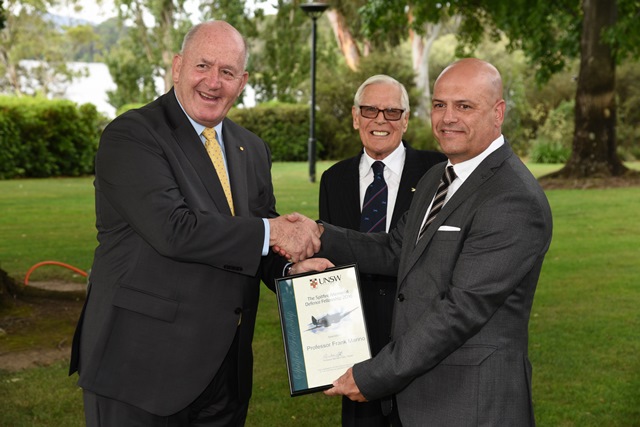A Charles Sturt University (CSU) scientist has been awarded a prestigious research fellowship to examine whether dehydration is of any consequence to Australian military personnel in the field.
 The
Head of the CSU School
of Human Movement Studies, Professor Frank Marino was presented with the Spitfire Memorial Defence Fellowship by
the Governor General, His Excellency General the Hon. Sir Peter Cosgrove in a
ceremony in Canberra on Monday 7 December.
The
Head of the CSU School
of Human Movement Studies, Professor Frank Marino was presented with the Spitfire Memorial Defence Fellowship by
the Governor General, His Excellency General the Hon. Sir Peter Cosgrove in a
ceremony in Canberra on Monday 7 December.
Professor Marino's research aims to provide local information to develop guidelines for hydration for Australian troops.
"The current recommendations for Australian Defence Force personnel are based on research carried out overseas and mainly as a consequence of physical work being carried out in hot conditions," Professor Marino said.
"My research will study the impact of dehydration, water availability, and consumption, on the physical and cognitive performance of people performing a number of tasks in typical combat apparel.
"It remains to be shown whether dehydration in army personnel actually impacts negatively on performance."
The $35 000 fellowship will allow Professor Marino to undertake the research over the next year and he hopes the findings will also contribute to the wider conversation about hydration levels, exercise, and performance.
"There's a popular assumption that dehydration should be avoided at all costs by replacing fluids lost through sweating," Professor Marino said.
"Hydration has been the practice of choice for dealing with physical activity in the heat regardless of training status.
"It's a message that's been adopted by military and sporting bodies and has been used by marketers promoting hydration as a way of improving performance.
"But Charles Sturt University research examining dehydration and hydration using self-paced exercise protocols has shown that dehydration to at least four per cent of body mass has no effect on performance.
"It's also important to note that over-hydration which can lead to a condition known as hyponatremia can be dangerous and potentially fatal. The diagnosis of this condition has increased world-wide over the past decade.
"There needs to be a greater awareness of the dangers of hyponatremia and better understanding about the need for adequate, not excessive hydration," he said.
Read more about Professor Marino's previous research on CSU News here.
President of the Spitfire Association, Mr Geoff Zuber said, "This is the largest grant awarded in the history of the Spitfire Memorial Defence Fellowship Scheme and we believe Professor Marino's research will provide valuable information to the defence community."
The Spitfire Memorial Defence Fellowship Scheme was established by ex-wartime Spitfire pilots and their ground crews for research in areas of defence. Read more here.





Social
Explore the world of social